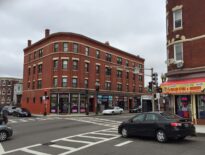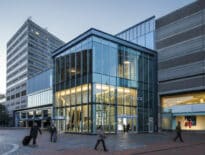Boston’s new push to boost its neighborhood retailers is coming at a welcome time, just as Gov. Charlie Baker is proposing a similar move statewide.
As Steve Adams reports in this week’s issue, Mayor Michelle Wu is steering around $5 million to the “Main Streets” nonprofits that promote local business districts and help individual shops navigate city bureaucracy. She also wants to put another $9 million in federal pandemic relief into rent rebates for these smaller storefronts, many of which are still suffering from pandemic cuts to their business.
Then, just as this issue of Banker & Tradesman was going to press, Baker unveiled a $3.5 billion economic development bill that includes $970 million in grants toward downtown and community revitalization efforts.
Smaller retailers are often the hearts of their communities – familiar meeting-places or icons of particular places. They are also one of the classic ways people can raise their station in life, by starting and building a business. Yet the pandemic, and pandemic-driven changes in consumer behavior, are putting many under pressure.
As many of the columnists in this month’s issue of CRE Insider write, the nature of retailing is changing at warp speed. Familiar pressures from Amazon and other large corporations started to snowball over the last two years, at the same time as the pandemic has dramatically cut foot traffic in many shopping districts.
Yet, even as “omnichannel” has moved from a buzzword used by Millennial-focused shops to table stakes for most retailers, many mom-and-pop stores are still struggling to adapt. This is where Wu’s and Baker’s proposals come in.
Rent rebates and similar programs can help stabilize small businesses today, while investments in Main Streets-type organizations and downtown revitalization initiatives will help build capacity among those who can help retailers stride confidently into a new era. They can also help create programming and other efforts that will put communities’ retail districts back on shoppers’ “mental maps.”
Let’s hope these two packages of good ideas find favor with state legislators and Boston city councilors. These twin efforts couldn’t have come at a better time.






